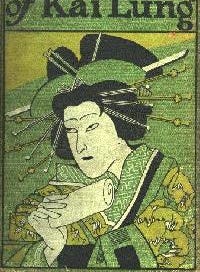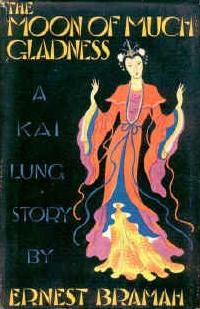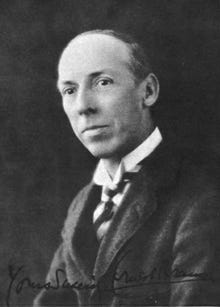"It would be hypocrisy to seek for the person of the Sacred Emperor in a Low Tea House."1 -Ford Madox Ford quoting Chinese proverb written by Ernest Bramah.
Ernest Bramah (Smith) (20 March 1868 – 27 June 1942) was an English author who published 21 books and numerous short stories and features.2
He created the character, Kai Lung, a fictional itinerant story-teller of ancient China. The books were very popular and quotations from them were used by many other authors in the early 20th century. He was considered expert in Chinese culture.
The Wallet of Kai Lung (1900)
Kai Lung's Golden Hours (1922)
Kai Lung Unrolls His Mat (1928)
The Moon of Much Gladness (1932; published in the United States as The return of Kai Lung)
The Kai Lung Omnibus (1936). Includes The Wallet of Kai Lung, Kai Lung's Golden Hours and Kai Lung Unrolls His Mat
Kai Lung Beneath the Mulberry Tree (1940)
"A reputation for a thousand years may depend upon the conduct of a single moment." ~ Ernest Bramah
Bramah’s decision to use certain types of exaggerated language in the context of his times established the “Chineseness” of his discourse.3
Smith was circumspect when asked about his travels and time in China. After his death his papers were acquired by the Henry Ransom Center.4
“I have never been in China.”
I have never been in China, but I do not know that (to others) it is diplomatic to be specific on this point. It has seemed to me that an attitude might be: (a) if I have lived in China then the stories are probably merely translations or at all events not entirely original [;] (b) if I have not been in China and have no special knowledge, then the whole fabric is imaginary and unreliable as a picture of Chinese life; so that I have in general rather evaded the direct question, desiring personally only that the books should be taken as they stand. However, that blameless secret is now in your keeping and I shall not reproach you whatever use you make of it.5
Hawthorn, Jeremy, ‘Ernest Bramah: Source of Ford Madox Ford’s Chinese Proverb?’ Notes and Queries, 63.2 (2016), 286-288.
White, William (1967). “Country Correspondent to Editor and Novelist: Ernest Bramah (1868-1942).” Journalism Quarterly 44, no. 4.
St. André, James. “‘Long Time No See, Coolie.’” In Les Presses de l’Université d’Ottawa | University of Ottawa Press. Les Presses de l’Université d’Ottawa | University of Ottawa Press, 2017.
Ernest Bramah: An Inventory of His Collection at the Harry Ransom Center. The University of Texas at Austin.
White, William. “Ernest Bramah on China: An Important Letter.” PMLA : Publications of the Modern Language Association of America 87, no. 3 (1972): 511–13.







Blameless secret. Indeed!
A lot of 19th century writers like that, I do believe. I suppose that makes Kai Lung the predecessor of Charlie Chan.
"Smith’s decision to use certain types of exaggerated language in the context of his times established the “Chineseness” of his discourse."
That said, who's Smith?
elm
?